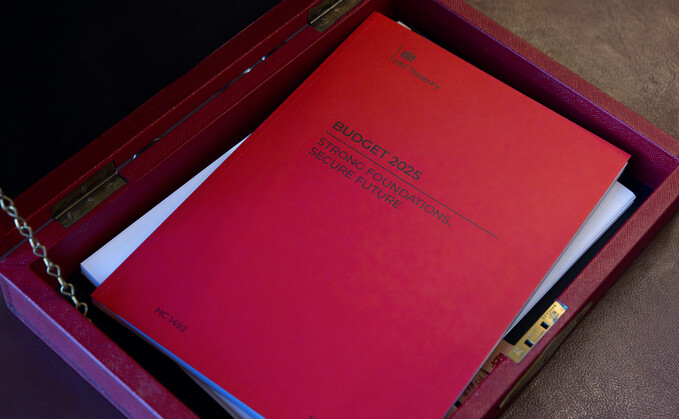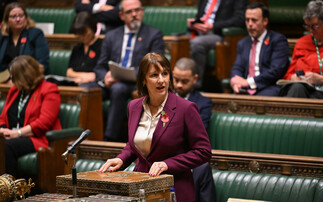
The OBR report said salary-sacrificed pension contributions above an annual £2,000 threshold will no longer be exempt from NI contributions (NICs) from April 2029. Picture by Kirsty O'Connor / Treasury
The government will limit the amount of salary a person can sacrifice through pension contributions without incurring National Insurance (NI) payments to £2,000, Chancellor Rachel Reeves has announced.
In her Budget speech today (26 November), Rachel Reeves said the cost of salary sacrifice would rise from around £2.8bn in 2017 to a projected £8bn in 2030, with the greatest benefits going to the highest earners – a situation she said was "not sustainable".
As a result, Reeves said salary-sacrificed pension contributions above an annual £2,000 threshold would no longer be exempt from NI contributions (NICs) from April 2029 – a move she described as "a pragmatic step".
Accidental OBR release
The announcement comes after the Office for Budget Responsibility (OBR) prematurely published its post-Budget economic and fiscal forecast – accidentally revealing the salary sacrifice limits, which would be subject to employer and employee NICs.
It said ordinary employer pension contributions will remain exempt from NICs.
The OBR forecast that charging NI on salary-sacrificed pension contributions would raise £4.7bn in 2029-30 and £2.6bn in 2030-31.
It said its costing assumes that in most cases, employee pension contributions above £2,000 that were part of a salary-sacrifice scheme will become subject to employer and employee NICs – either because they move to a standard pension scheme or continue in a salary-sacrifice scheme under the new tax arrangements.
Despite this, the OBR said the estimated yield from this measure was "subject to uncertainties" related to potential responses to the change by employers and employees.
It said employers could look to replicate the tax benefits of salary sacrifice by reducing future wage growth and instead providing employees with higher employer pension contributions. It said it would also be possible to formally replicate salary sacrifice through an agreement to reduce wages and increase employer pensions contributions.
Budget 25: Reeves to slash Cash ISA allowance to £12,000 but over-65s exempt
The OBR reported such behaviour would be constrained by interactions with Operational Remuneration Agreement (OpRA) rules and employment law meaning that such reductions would need to be agreed with the entire workforce, so it said this is unlikely to be a widespread response.
Overall, it estimated these responses could reduce the yield by £700m by 2030-31.
Employees switching to RAS schemes
The OBR said its costing assumes many employees will switch to making ordinary pension contributions, some of which will be to relief at source (RAS) schemes. Where an employee contributes to a RAS scheme, they will initially pay higher- and additional-rate income tax on their pension contributions, and then reclaim this through their self-assessment return in the next year.
The OBR said this creates a temporary timing effect as employees switching from salary sacrifice to RAS in 2029-30 pay increased tax in that year, and then reclaim it in 2030-31, boosting 2029-30 receipts by £1.6bn. Beyond the forecast period, it said this effect becomes small.
Pass-through
The OBR said that, as with the October 2024 changes to employer NICs rates and thresholds, it assumed employers will seek to pass 76% of this additional cost to employees.
In this case, it assumed that, of this, 50% is passed to employees through lower ordinary employer contributions, which are not taxed, and 50% is passed through lower salaries and bonuses, which are taxed. Overall, it said this reduces the yield from the measure by around £700m by 2030-31.
Costing of changes to the salary-sacrificed pensions regime

Source: OBR
Pre-Budget speculation
The move will follow weeks of speculation around the Budget – with The Times and Financial Times reporting earlier this month that the chancellor would target salary sacrifice arrangements in a bid to help fill a gap in public finances.
At present, there is no limit on the amount that an employee can put into their pension under salary sacrifice schemes before it becomes subject to NI. The cap will mean that any pension contributions over the £2,000 level would result in an employee paying the full rate of NI of 8% on a salary of less than £50,000 and 2% on income above that.
The move has been strongly resisted by the pensions sector ahead of the Budget – with Pensions UK saying a move to limit salary sacrifice would "hit working people" and result in "less money flowing into pensions".
Pensions UK executive director of policy Zoe Alexander said last week: "Any change to salary sacrifice would inject uncertainty into a system that needs long-term trust, not sudden shocks. It would add operational pressure for employers and risk undermining the retirement prospects of working people across the country."
She added: "Introducing a cap would weaken incentives to save when we are facing a generation retiring with inadequate retirement savings."
Budget 25: Rachel Reeves announces extension of income tax threshold freeze
The Association of British Insurers (ABI) said research it had conducted with Opinium Research showed two in five (38%) adults would save less into their pension if a salary sacrifice scheme cap was implemented.
Separate research conducted by the ABI in association with Reward and Employee Benefits Association (REBA) found that, if the government were to introduce a £2,000 threshold on salary sacrifice for pension contributions, some 31% of businesses would reduce their contributions to an employee's pension, and 45% would reduce other employee benefits and services.
Commenting ahead of the Budget, ABI director of policy and long-term savings Yvonne Braun said: "These types of short-term revenue raisers put the long-term security of people's futures at risk."
The cost of a £2,000 cap
After the latest speculation surfaced, WTW assessed what a Budget clampdown on pension salary sacrifice could mean for employers and employees.
WTW said the above figures were based on standard contribution levels and did not capture the impact for employees contributing more personally or for employers offering higher contribution rates.
It noted, however, that "even at standard levels, the change would make saving less attractive and risk eroding trust in the system".
At the beginning of this month, the Society of Pension Professionals (SPP) said it had written to all 650 members of parliament to warn against the risks of reducing or removing salary sacrifice arrangements for pension contributions.
The SPP noted around a third of private sector employees currently use salary sacrifice arrangements, as well as almost 10% of public sector workers.
The society argued this makes salary sacrifice a "well established" and "well-functioning" feature of the UK pensions landscape.
The SPP calculated the cost to the government in providing salary sacrifice arrangements was £4.1bn, which amounted to £1.2bn for employees and £2.9bn for employers. However, the SPP stated there is "widespread recognition" this is a positive investment which incentivises pension saving.
The SPP's paper also said scrapping salary sacrifice would represent a "sizeable" cost to employers and would also breach the chancellor's commitment to not impose any additional costs on employers.
HMRC research
Reeves' Budget move on salary sacrifice comes just months after HM Revenue and Customs published research looking at the experiences, motivations, and attitudes of employers towards using salary sacrifice arrangements for pensions.
As part of the research, HM Revenue & Customs explored whether "hypothetical changes to tax reliefs, such as reform of NI relief" on pension salary sacrifice arrangements could impact employers' motivations and attitudes towards these arrangements.
One of the scenarios modelled by HMRC looked at the impact of removing the NI exemption for salary sacrifice pensions beyond a threshold of £2,000 per year.
It said that, for an employee earning £45,000, reducing their salary by 5% would result in £2,250 of salary sacrificed per year. Under a cap, HMRC said the £250 above the £2,000 threshold would be liable to employee and employer NI, meaning the employee would pay an additional £30 in NI and the employer would pay an additional £34 in NI.
Budget 25: Employer NI contributions thresholds frozen for three years from 2028/29
HMRC said employers "generally responded to this scenario most positively" of the three it tested – with some noting that, due to the level of their staff wages, it would have minimal impact on their business.
But it added that "most employers" were still concerned that this scenario resulted in a reduction of benefits and that, regardless of earnings, it could "disincentivise saving for a pension".
It said a common response from employers was that, despite this scenario not impacting many employees due to the wage threshold, there was a concern that changing the rules around salary sacrifice for pensions may inevitably cause confusion and risk people becoming more disengaged with pensions.
Employers also said there would be additional administrative burdens associated with this area - noting that this scenario was the most complicated of the scenarios HMRC had looked at and expressing frustration at the added burden of calculating the impact of salary sacrifice for each employer as a result.
















